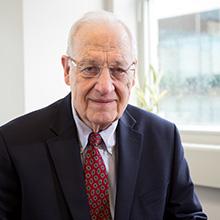Clarence Stone

Clarence Stone
Research Professor
Contact:
Clarence Stone is a Research Professor of Political Science and Public Policy. An emeritus member of the faculty of the University of Maryland, College Park, Stone was a Visiting Fulbright professor at the University of Southern Denmark in 2001-2002. He is a past president of the Urban Politics Section of APSA (the American Political Science Association). His research interests focus on cities, particularly the politics of U.S. cities. He is especially known for his work on civic capacity and urban regimes, and also more general work on power and leadership. His book, Regime Politics, was the winner of two awards sponsored by the American Political Science Association, and an earlier book, Economic Growth and Neighborhood Discontent, won the Southern Political Science’s Chastain Award, and his co-authored book, Building Civic Capacity, won a best book award of The Urban Politics Section of APSA. Stone favors a spatial approach to urban policy and problems, and a co-authored work, Urban Neighborhoods in a New Era: Revitalization Politics in the Postindustrial City, is scheduled for publication in the spring of 2015.
Books:
Economic Growth and Neighborhood Discontent. University of North Carolina Press (1976)
Regime Politics. University Press of Kansas (1989)
Building Civic Capacity with Jeffrey Henig, Bryan Jones, and Carol Pierannunzi. University Press of Kansas (2001)
Urban Neighborhoods in a New Era: Revitalization Politics in the Postindustrial City. With Robert Stoker and others. University of Chicago Press (forthcoming).
Articles and Chapters:
"Systemic Power in Community Decision Making: A Restatement of Stratification Theory," American Political Science Review, Vol. 74 (December 1980), 978-990.
"Urban Regimes and the Capacity to Govern," Journal of Urban Affairs, Vol. 15 (#1, 1993), 1-28.
"Regime Analysis and the Study of Urban Politics," Journal of Urban Affairs, Vol. 20 (#3, 1998), pp. 249-260.
“Power,” in Oxford Handbook of Urban Politics, ed. by Susan Clarke, Peter John, and Karen Mossberger (Oxford Univ. Press 2012). Pp. 11-28.
“Beyond the Equality-Efficiency Tradeoff,” in Justice and the American Metropolis, ed. By Clarissa Hayward and Todd Swanstrom (Univ. Minnesota Press: 2011). Pp. 125-145.
“Through a Glass Darkly: The Once and Future Study of Urban Politics” (with Robert Whelan) in The City in American Political Development, ed. by Richardson Dilworth (Routledge 2009). Pp. 98-118.
“Who Is Governed? Local Citizens and the Political Order of Cities” in Theories of Urban Politics, 2nd edition, ed. by Jonathan Davies and David Imbroscio (Sage 2009). Pp. 257-273.
“Urban Politics Then and Now,” in Power in the City: Clarence Stone and the Politics of Inequality, ed. by Marion Orr and Valerie Johnson (University Press of Kansas 2008) pp. 267-316.
RUN: Beginning with an invitation from the Rockefeller Foundation’s Bellagio Study and Conference Center to direct a workshop on the comparative study of urban neighborhood transformation, Stone has coordinated a project on Regenerating Urban neighborhoods (RUN). The forthcoming book, Urban Neighborhoods in a New Era, is a product of this project. With colleagues Robert Stoker of George Washington University and Donn Worgs of Towson University, Stone continues to examine the politics of Baltimore as it continues its transition from an industrial past to the present post-industrial time. With its heyday as a center of manufacturing long past, Baltimore seeks a place in the global economy through its “ed & med” sector and help from an active philanthropy community.
City Governance: The RUN project is interwoven with an ongoing analysis of how cities are governed as they respond to the challenges of the post-industrial period. As approached in the forthcoming book, Urban Neighborhoods in a New Era, the present politics of cities can be usefully analyzed by comparing politics in the present post-industrial time with the politics of the redevelopment era that took shape after the end of the Second World War. Education, information technology, and new demographic patterns put city governance in a context fundamentally different from the age of redevelopment, when much of the existing understanding of city politics and governance took shape.
The American City of the Future: As a step toward a fresh understanding of city politics, Clarence Stone is working with GW Sociology colleague Gregory Squires to develop a course on the future of the American city. Themes include coping with gentrification, tensions between pursuit of the “creative class” and “the right to the city” along with related social equity concerns, an the challenge of promoting educational opportunity commensurate with post-industrialism.
Urban Neighborhoods in a New Era: Revitalization Politics in the Postindustrial City
September 18, 2015
April 01, 2012
Beyond the Equality-Efficiency Trade-off
August 01, 2010
Who is Governed? Local Citizens and the Political Order of Cities
October 01, 2009
Through A Glass Darkly: The Once and Future Study of Urban Politics (PDF)
April 01, 2009
Community Building and a Human-Capital Agenda in Hampton
July 30, 2004

